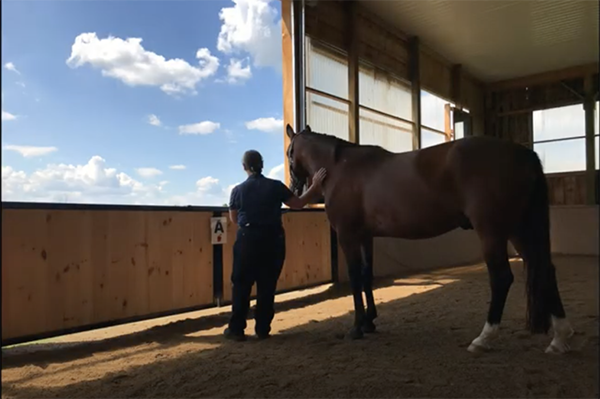Journey Through the Horses’ Digestive Track
By: Nicole Weidner, Equine Guelph
Learn Practical Nutrition Tips with New Equine Guelph Videos
Why are forage and/or forage-based feeds or alternatives so important for a horse’s digestive system? You will find out in part three of their three-part video series on equine digestion. Watch as we take what we’ve learned in the previous two videos and apply it to how and what we feed horses. You’ll learn practical information that will help you meet the needs of your horse’s digestive system. All three videos will be available in Equine Guelph’s December Enews that will be released on December 2, 2020. Subscribe to Equine Guelph’s monthly Enews, for free so you don’t miss out on the video series, generously made possible by Trouw Nutrition Canada.
Gayle Ecker and Jack the standardbred are both featured in Equine Guelph’s three-part video series that takes viewers on a journey through the horse’s digestive tract. All three videos will be available to subscribers of Equine Guelph’s monthly communications. Sign up here (link: https://www.equineguelph.ca/news/signup.php)
The three-part video series helps viewers learn what the equine digestive system looks like and how it works and uses this to explain why certain feeding strategies are more appropriate than others. The series uses a life-size model of the digestive system to show viewers what each organ looks like and how big it really is. The model was made with artificial materials, so the videos are ideal for anyone with a weak stomach (no pun intended) as there are no graphic images. Part one covers the first section of the horse’s digestive system, including the mouth, teeth, esophagus, stomach and small intestine. Part two focuses on the horse’s hindgut, which is a term that refers to the horse’s cecum, large colon, small colon and the rectum. Part three takes what we’ve learned about the digestive system and applies it to how we feed horses, including what we feed them.
Part three will cover why forage and/or forage-based feeds are important for a horse’s digestive system. The video also discusses feeding strategies, like providing small, frequent amounts of food and keeping the diet consistent from day to day. Sign up here (link: https://www.equineguelph.ca/news/signup.php) to be sure you catch the video release and to access the first two parts of the video series.











